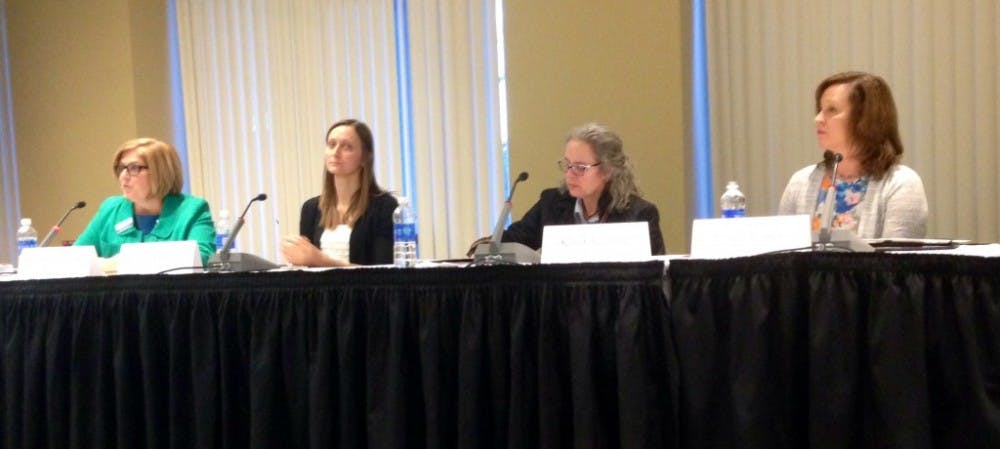Kim Crawford raised her voice a bit, spoke in a sharp, serious tone and delivered a number of robust messages Tuesday night, but one might have resonated a little more than the rest.
She and her three co-panelists were prompted about why, in a country that produces so much food, is hunger still an issue?
“It’s appalling,” said Crawford, the executive director of Allied Churches of Alamance County. “But then the question needs to be turned around. How many of us are actually doing something? How many of us in this room actually vote? Not just vote, but be aware of the issues, and bring issues up.”
That’s perhaps what bothers Crawford most about the overarching problem of hunger — the lack of action. Hunger in Alamance County was the issue tackled by the Community Connections forum sponsored by Elon University and the Burlington Times-News Tuesday night in McKinnon.
More than half the room was filled, and questions paced the greater part of an hour in regard to the issue that’s prominent in the area around Elon.
North Carolina ranks 10th nationally in food hardship, and 19 percent of Alamance County citizens are food insecure — the national average is 14.3 percent. Eleven percent of Alamance County residents are both low income and don’t live near a grocery store.
Close to 21,000 residents receive food stamp benefits, and at least 11 percent of Alamance County residents receive meals or groceries from local agencies.
“What we have seen is traditionally, the people you would think would receive (food stamps) are adults, unemployed. It’s turned more into families,” said Linda Allison, deputy director of Alamance County Department of Social Services. “I’ve seen, the last six to eight years particularly, more working families. They just can’t just make end meets.”
A massive hit to the area came in September 2013 when Loaves and Fishes Christian Food Ministry, Inc. closed its doors. The food bank supplied food to about 7,000 people each month.
In response, Crawford led the charge to open up a food pantry at Allied Churches.
“I knew nothing about running a food pantry,” Crawford said. “But I knew we needed to do something.”
It’s that initiative that she looks for in the rest of the community to help resolve the issue. She said money and awareness helps, but it has to be in the right form.
“People donate food all the time, but if you give me a can of pumpkin pie filling, it doesn’t really help me,” Crawford said. “The conversation is really important. Come to the soup kitchen and eat, and realize how much of your life is around food. We’re social people. We need to keep that in mind.”
At Elon, there are a number of ways for students and others to help out in regard to the hungry. Elon has its own Campus Kitchen, and the Kernodle Center for Service Learning offers volunteer opportunities for students. In addition, Helping Other People Eat (HOPE) is a student-run program that raises money to help feed those in Alamance County.
Svetlana Nepocatych, assistant professor exercise science at Elon, emphasized that it’s more than just feeding these people — it’s about providing them with food that’s good for them.
She spoke about the tendency to lean toward fast food restaurants because of cheap prices but the nasty health issues that could result from that food.
“It’s a different kind of malnutrition,” Nepocatcych said. “We might have enough calories, but we may lack a lot of macro- and micronutrients that we need for development, mental development and eyesight. We have a high number of children who consume 40 or so gallons of soda versus maybe two or three gallons of milk.”
The audience was asked to text in responses to poll questions shown on a slideshow during the forum.
Heidi Norwick, president of United Way, paused and looked up at one of the questions while she was talking.
Do you think the country is making progress, losing ground, or are things about the same as they have been when it comes to hunger?
“We’re definitely making progress,” Norwick said. “It’s much more of a community-wide conversation we’re having now.”
Except the national response and that of the audience reveals that the majority of people say the country is losing ground.
That’s where, once again, Crawford pulls in the community.
“We need people to sit down and have a conversation, and do it more than once,” Crawford said. “You will learn some remarkable things about the people that are coming — all they’re trying to do is eat, or get some sort of nourishment. We have to keep in mind that people are hungry. Sure, they’re hungry for food, but they’re hungry for so much more than that.”


